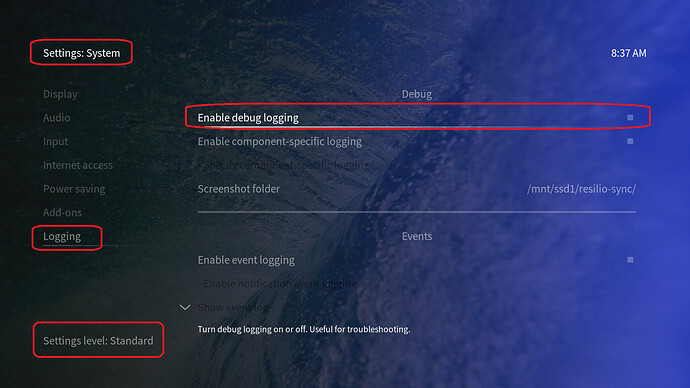Hello.
First of all sorry for my English…
I have playback problems on video : there are some jerk (image stop and restart very quickly).
Hardware : Raspberry Pi 2
Version : OSMC 2018.12-1 - Version : OSMC running Kodi 17.6 -> no problem
update to : OSMC 2019.04-1 - Version : OSMC running Kodi 18.2-RC1 -> jerk problem
fresh install of : OSMC_TGT_rbp2_20190623.img -> same problem
As you can see the only thing changing is the OSMC version. Just in case, Raspberry Pi is connected to TV on HDMI port, network, and a powered USB hub for a 2.5" HDD. No additional card.
I don’t check with all my video files, but with 2 files coming from the same source : French TV broadcast recorded with a VBox XTi-3442.
Perhaps there is a specific codec for these streams.
To repeat the problem I just have to play the video, problem appears from the begining. Tell me if you need the video file to reproduce the problem.
You can find here the stream information get with mediainfo :
Général
Identifiant unique : 212371454802296734590325157327804885351 (0x9FC54121414D719BB92BC7FA7B24E967)
Nom complet : R:\Média\Vidéo\Séries\Meurtres à... (2013)\Saison 04\Meurtres à... S04E11 Meurtres en Haute-Savoie.mkv
Format : Matroska
Version du format : Version 2
Taille du fichier : 2,27 Gio
Durée : 1 h 33 min
Débit global moyen : 3 459 kb/s
Date d'encodage : UTC 2018-11-23 17:38:49
Application utilisée : mkclean 0.8.7 ro from Lavf57.25.100
Bibliothèque utilisée : libebml2 v0.21.1 + libmatroska2 v0.22.1
Vidéo
ID : 1
Format : AVC
Format/Info : Advanced Video Codec
Profil du format : High@L4
Paramètres du format, CABAC : Oui
Paramètres du format, RefFrames : 4 images
Paramètres du format, GOP : M=6, N=32
Type de muxing : Header stripping
Identifiant du codec : V_MPEG4/ISO/AVC
Durée : 1 h 33 min
Débit : 3 198 kb/s
Largeur : 1 920 pixels
Hauteur : 1 080 pixels
Format à l'écran : 16/9
Type d'images/s : Constant
Images par seconde : 25,000 Im/s
Norme : Component
Espace de couleurs : YUV
Sous-échantillonnage de la chrominance : 4:2:0
Profondeur des couleurs : 8 bits
Type de balayage : MBAFF
Ordre de balayage, mode d'enregistrement : Trames entrelacées
Ordre de balayage : Ligne du haut d'abord
Bits/(Pixel*Image) : 0.062
Taille du flux : 2,10 Gio (92%)
Default : Oui
Forced : Non
Gamme de couleurs : Limited
Coordonnées de chromaticité : BT.709
Caractéristiques du transfert : BT.709
Coefficients de la matrice : BT.709
Audio
ID : 2
Format : MPEG Audio
Version du format : Version 1
Profil du format : Layer 2
Paramètres du format, Mode : Joint stereo
Type de muxing : Header stripping
Identifiant du codec : A_MPEG/L2
Identifiant du codec/Suggestion : MP2
Durée : 1 h 33 min
Type de débit : Constant
Débit : 192 kb/s
Canaux : 2 canaux
Echantillonnage : 48,0 kHz
Mode de compression : Avec perte
Délai par rapport Vidéo : 36 ms
Taille du flux : 129 Mio (6%)
Langue : Français
Default : Oui
Forced : Non
Thanks for your work (I use Kodi on OSMC every on Rasperry Pi since 5 years) and to help me to resolve this problem.
